中國文化研究所《中國文化研究所學報》第 70 期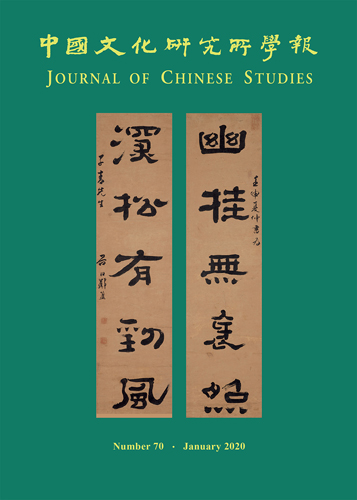 本期刊載論文六篇、書評十篇,共約二百六十頁。 論文
陳晶晶:〈壁畫、文本與政治:司馬承禎《真圖讚》與唐代淨土經變畫〉
許凱翔:〈唐宋蜀地廟市的宗教空間:以三月三日蠶市為例〉
嚴志雄:〈從「近代詞人」到「人文世界」:錢謙益《論近代詞人》組詩考論〉
楊晉龍:〈不應存在的存在:《四庫全書》的錢謙益身影考論〉
羅樂然:〈朝鮮漢語譯官與中朝文化交流網絡的構築:以李尚迪與阮堂《歲寒圖》的關係為研究中心〉
Rostislav Berezkin and Vincent Goossaert: “The Wutong Cult in the Modern and Contemporary Suzhou Area”
書評
Nianshen Song, “Remaking the Chinese Empire: Manchu-Korean Relations, 1616–1911. By Yuanchong Wang”
Allan H. Barr, “ The Dreaming Mind and the End of the Ming World. By Lynn A. Struve”
Poo Mu-chou, “Heaven Is Empty: A Cross-Cultural Approach to 'Religion' and Empire in Ancient China. By Filippo Marsili”
Daiwie Fu, “Shen Gua' s Empiricism. By Ya Zuo”
Maxim Korolkov, “Literate Community in Early Imperial China: The Northwestern Frontier in Han Times. By Charles Sanft”
Barbara Kaulbach, “Efficacious Underworld: The Evolution of Ten Kings Paintings in Medieval China and Korea. By Cheeyun Lilian Kwon”
Edmund S. K. Fung, “Voting as a Rite: A History of Elections in Modern China. By Joshua Hill”
Bruce Rusk, “Bronze and Stone: The Cult of Antiquity in Song Dynasty China. By Yunchiahn C. Sena”
James McMullen, “Imagining China in Tokugawa Japan: Legends, Classics, and Historical Terms. By Wai-ming Ng”
Meir Shahar, “Mouse vs. Cat in Chinese Literature: Tales and Commentary. Translated and introduced by Wilt L. Idema”
翻譯研究中心《譯叢》(English version only)
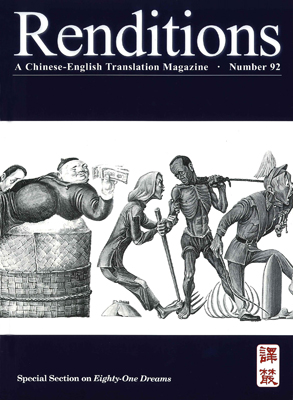 Renditions Renditions no. 92 (Autumn 2019) is a general issue with a special section dedicated to excerpts from Zhang Henshui’s 張恨水 Eighty-One Dreams 八十一夢, a series of fantasies revolving around life in China before, during, and what the author images things might be like after the War of Resistance, beautifully rendered by Simon Schuchat. Other features comprise two pieces published in the same journal in the final decade of the Qing dynasty, one being “A New History of Rats” 新鼠史, an amusing allegory of Chinese weakness and potential for recovery, the other a short and lively satire titled “School Inspection” 查功課 by Wu Jianren 吳趼人.
當代中國文化研究中心《二十一世紀》2019 年 12 月號,第 176 期
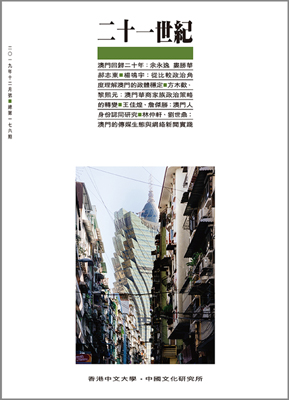
本期「二十一世紀評論」以「澳門回歸二十年」為題,探討回歸以來澳門在政治、社會、經濟方面的深刻轉變。
余永逸:論澳門「一國兩制」模式的可持續性
婁勝華:回歸後澳門社團發展與社會角色的嬗變
郝志東:「負責任博彩」?——澳門博彩業中政府和運營商的角色
本期學術論文,亦同樣關涉到「澳門模式」可持續性的討論。
楊鳴宇:從比較政治角度理解澳門的政體穩定
方木歡、黎熙元:回歸前後澳門華商家族政治策略的轉變
王佳煌、詹傑勝:澳門人身份認同研究——與香港比較
林仲軒、劉世鼎:澳門的傳媒生態變遷與網絡新聞實踐
其他欄目包括景觀、研究筆記、書評,都環繞著澳門的各個方面有所探索。
呂澤強:回歸前澳門申報世界文化遺產及其影響
鄭宏泰:「雙重中間性」——澳門與香港混血群體的社會學考察
蘇常:賭博資本主義的夢魘——評Janet Ng, Dreamworld of Casino Capitalism: Macao’s Society, Literature, and Culture
陳如珍:漂泊的主體——評史唯《澳門移工:漂泊在中國的拉斯維加斯》
當代中國文化研究中心《二十一世紀》2020 年 2 月號,第 177 期
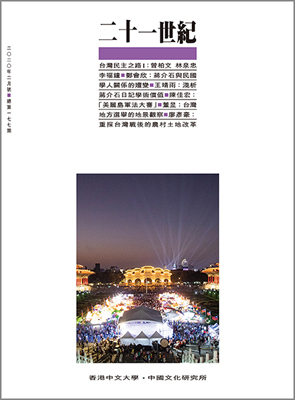 本期及下期(連續兩期)的「二十一世紀評論」均以「台灣民主之路」為題,深入分析是次台灣選舉結果帶來的啟示。
曾柏文:從太陽花到2020年台灣大選:時代結構、政治軸線與民粹起落林泉忠 二十一世紀台灣國族認同啟示錄
李福鐘:從威權統治到民主化——七十年的台灣政治變遷
四篇學術論文研究時段橫跨南京國民政府時期以迄台灣解嚴前夕,以蔣介石、蔣經國與知識份子以至不同政治社會力量互動的歷史為主軸。
鄭會欣:蔣介石與民國學人關係的嬗變(1932–1949)
王靖雨:淺析《蔣介石日記》(手稿本)的學術價值與使用方法
廖彥豪:從都市化與工業化視野重探台灣戰後農村土地改革
陳佳宏:從「美麗島軍法大審」看國民黨當局對黨外力量的壓制
而本期景觀欄目,亦透視台灣地方選舉的地景觀察。
當代中國文化研究中心《二十一世紀》2020 年 4 月號,第 178 期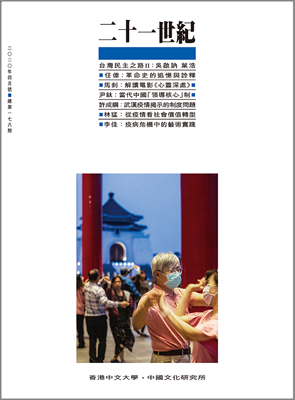
本期「二十一世紀評論」承接上期討論,深入探討台灣民主化的種種問題。
吳啟訥:民主化抑或民族主義化?——從歷史視角觀察台灣政治轉型
葉 浩:理想與現實之間的民主政治——台灣黨國體制及其遺緒的反思
學術論文
任 偉:中共革命史的追憶與詮釋——以平江起義為例
左 慈:試析鎮壓反革命運動中的處決比例問題
馬 釗:革命記憶重構與1980 年代初文化轉型——解讀電影《心靈深處》
尹 鈦:當代中國政治中「領導核心」制之研究
近月全球正面對嚴峻的疫情,本期「研究筆記」欄目特別刊載兩篇相關文章。
許成鋼:武漢疫情揭示的制度問題
林 猛:從疫情的報導和討論看社會價值的轉型
而「景觀」欄目,題為〈疫病危機中的藝術實踐〉,展現不同形式的藝術創作如漫畫、壁畫、雕塑、招貼、藝術行動等,所展現的是 2003 沙士 及 2019 新冠肺炎的社會風貌。
吳多泰中國語文研究中心《中國語文研究》第 40 卷第 2 期
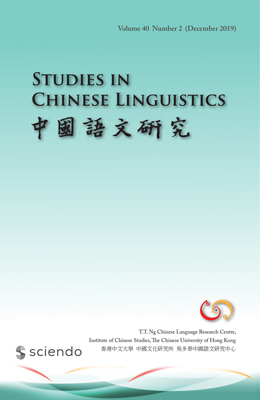
《中國語文研究》第40卷第2期已經出版。本期刊載三篇英文文章:
張寧:〈存現於漢語〉
劉海詠:〈為什麼中文親屬所有結構的所有者的單複數很重要〉
黃嘉穎、C aterina Donati:〈對粵語主賓關係從句產出的不對稱性研究〉
劉殿爵中國古籍研究中心《先秦兩漢文獻傳注叢考——詞彙 · 訓詁 · 傳承》
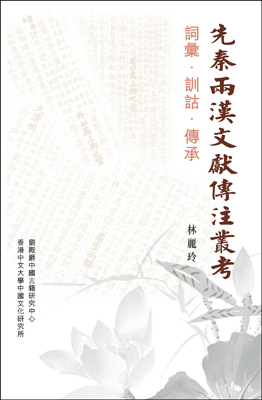 由林麗玲博士撰著、中國文化研究所劉殿爵中國古籍研究中心出版之《漢達古籍研究叢書》第四十八種《先秦兩漢文獻傳注叢考——詞彙.訓詁.傳承》,已於2020年4月出版。
該書蒐集《荀子》、《莊子》、《管子》等古籍中之罕見詞彙,以文本、詞彙比對的角度,重探古書之間的關係。該書又輯錄古籍傳注,旁參群書,輔以相關出土文獻,比對古書異文及其注解,探求漢代以來古籍傳注諸家,包括鄭玄、韋昭、王肅等,分析此等注解訓詁與古書異文之關係,望能有助學術界了解漢代以來學者注解古籍時之習用方法,以及注家理解文義時可有考慮相關異文。
《荀子》與《老》、《莊》關係重探——從詞彙用例考察
《管子》道德論說與秦漢雜家文獻關係考
荀卿自鑄新詞考
鄭玄 《禮記注》據郭店簡、上博簡《緇衣》異文為訓詁考
韋昭 《國語解》據異文為訓詁考
王肅 《孔子家語注》據異文為訓詁考 附:「王肅著書以難鄭」考
翻譯研究中心「譯叢文庫」(English version only)
Vague Expectations: Xiao Hong Miscellany
By Xiao Hong Compiled and translated by Howard Goldblatt 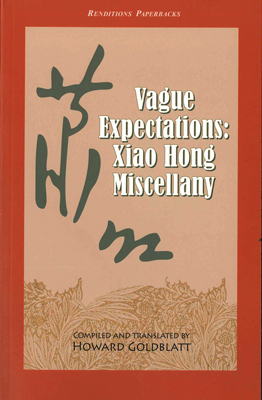 As a novelist, Northeast writer Xiao Hong has few peers. In the introduction to her maiden novel, Lu Xun, for whom praise had to be earned, wrote, “Keen observations and an extraordinary writing style add considerably to [its] vividness and beauty. Its spirit is robust.” This plaudit came at the beginning of her tragically truncated career and life. Barely six years later, Mao Dun would write about another of her novels: “Satire is here, and humour. At the start you read with a sense of relaxation; then little by little your heart grows heavier. Still there is beauty, slightly morbid perhaps but bound to fascinate you.” Less well-known, but equally impressive, is her corpus of stories, essays, and miscellaneous writing, most published during her short lifetime. The characteristics cited in the appreciations of the two titans of Republican letters are all visible in the two dozen pieces included in this volume. Little wonder that Xiao Hong is one of the most widely read, widely written about, and widely translated Chinese writers of the first half of the twentieth century.
Born in 1911, the year that the Manchu regime was overthrown, in Harbin, Heilongjiang, Xiao Hong began a writing career in 1933, gaining nationwide notice for her first novel, thanks largely to the patronage of Lu Xun, with whom she would develop a deep friendship. She was highly popular among writers and poets, who were her friends, and a host of countrymen and countrywomen, who were her fans, her reading public. She died in Hong Kong in 1942, only weeks after it fell to the Japanese.
Howard Goldblatt has translated a number of literary works from China and Taiwan, including the novels of Mo Yan, 2012 laureate of the Nobel Prize for Literature. A Guggenheim fellow and awardee of several literary prizes and grants, he lives in Colorado with his wife and frequent co-translator, Sylvia Lin. |